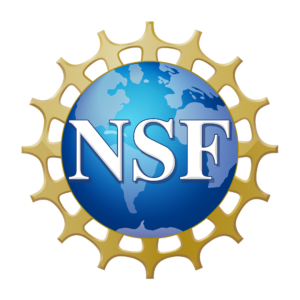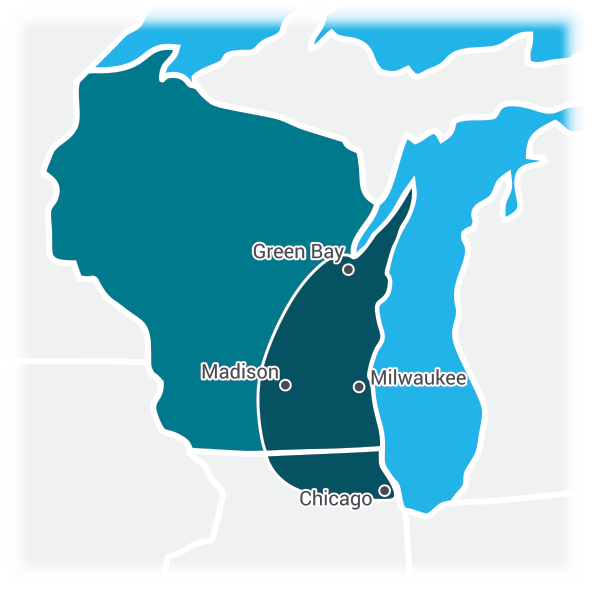TWC Wins $1M NSF Engines Development Award to Address Water & Energy Resiliency

The Water Council and its partners have been awarded $1 million from the U.S. National Science Foundation (NSF) to plan a Regional Innovation Engine in eastern Wisconsin addressing water and energy resilience for manufacturers and utilities.
The Water Council applied for the two-year grant with its lead partners MKE Tech Hub Coalition, Wisconsin Technology Council, Marquette University, Wisconsin Center for Manufacturing and Productivity, and Madison Region Economic Partnership.
“We know businesses and communities are desperately in need of solutions to mitigate and adapt to the effects of climate change. With its strong water and energy solution companies and leading research universities, Wisconsin is uniquely positioned to provide those solutions,” said Dean Amhaus, president and CEO of The Water Council. “This Resiliency Engine could be a true game-changer in terms of local economic development and assisting companies here, across the U.S. and globally adapt to the realities of climate change and the growing nexus of water and energy challenges.”
 The grant is awarded through NSF’s highly competitive Regional Innovation Engine program meant to advance critical technologies; foster partnerships across industry, academia, governments and nonprofits; promote and stimulate economic growth and job creation; and more. At the end of the two-year Development Award, the Engine team will apply for a Launch Award of up to $160 million over 10 years.
The grant is awarded through NSF’s highly competitive Regional Innovation Engine program meant to advance critical technologies; foster partnerships across industry, academia, governments and nonprofits; promote and stimulate economic growth and job creation; and more. At the end of the two-year Development Award, the Engine team will apply for a Launch Award of up to $160 million over 10 years.
“These NSF Engines Development Awards lay the foundation for emerging hubs of innovation and potential future NSF Engines,” said NSF Director Sethuraman Panchanathan. “These awardees are part of the fabric of NSF’s vision to create opportunities everywhere and enable innovation anywhere. They will build robust regional partnerships rooted in scientific and technological innovation in every part of our nation. Through these planning awards, NSF is seeding the future for in-place innovation in communities and to grow their regional economies through research and partnerships. This will unleash ideas, talent, pathways and resources to create vibrant innovation ecosystems all across our nation.”
 The primary region for the aspiring Engine – from Milwaukee west to Madison and from northern Illinois to the Fox Valley and Green Bay – already boasts many of the necessary resources, including renowned research universities, leading energy and water technology companies, and a strong manufacturing sector. The goal of the Engine is to align these resources around the theme of water and energy resiliency while ensuring the area offers a strong innovation pipeline and diverse, trained workforce to identify needs and quickly move solutions from the laboratory to the factory floor.
The primary region for the aspiring Engine – from Milwaukee west to Madison and from northern Illinois to the Fox Valley and Green Bay – already boasts many of the necessary resources, including renowned research universities, leading energy and water technology companies, and a strong manufacturing sector. The goal of the Engine is to align these resources around the theme of water and energy resiliency while ensuring the area offers a strong innovation pipeline and diverse, trained workforce to identify needs and quickly move solutions from the laboratory to the factory floor.
“Working with water is imbedded in Wisconsin’s DNA,” said Tom Still, president of the Wisconsin Technology Council. “Those same roots run deep in manufacturing and its relationship to energy and water use. The nexus of the three will result in innovation that can address climate change, confront rising energy prices, create efficiencies and encourage private investment. As a partner in the Resiliency Engine, the Wisconsin Technology Council will work to lever related resources across the state.”
Visit thewatercouncil.com/Resiliency to learn more about the vision for the Resiliency Engine, sign up for email updates, and learn about future events and activities. The official name for the project is Advancing Water & Energy Technologies for the Manufacturing & Utilities Sectors (WI, IL), Award No. 2304153.
Additional Quotes from the NSF Resiliency Engine Team:
“By aligning our collaborative efforts around a singular, unifying vision, we pave the way for growth and innovation, positioning our region as a leader in water and energy resiliency technology. This long-term endeavor will encompass research, commercialization and workforce development, with the Resiliency Engine harnessing the collective expertise of our partners,” said Kathy Henrich, CEO, MKE Tech Hub Coalition. “Together, we will address the pressing challenges of our time, empowering us to offer advanced innovative solutions that will shape a more sustainable and resilient future for all.”
“We at Madison Region Economic Partnership (MadREP) are thrilled to hear of the National Science Foundation’s awarding of the $1 million grant to The Water Council and its partners to plan a Regional Innovation Engine in eastern Wisconsin. This grant will go a long way to furthering our mission of advancing the economic vitality of south-central Wisconsin, providing a platform for regional collaboration and innovative solutions for water and energy resiliency for manufacturers and utilities.” said Jason Fields, President of MadREP.
“Marquette University is proud to partner on this NSF award and play a role in developing a Regional Innovation Engine by bringing together academic researchers and technology transfer leaders from around the region with industry partners and stakeholders to create innovative solutions that address climate-driven challenges,” said Dr. Jeanne Hossenlopp, vice president for research and innovation. “Marquette joined The Water Council as the first higher education institution to seek water stewardship verification, and this is another opportunity to work with The Water Council to continue serving with and for our community’s best interest. This award will create strong partnerships and invaluable collaborative opportunities throughout the region.”
“Our times demand strong domestic supply chains for both national and economic security,” said Buckley Brinkman, executive director and CEO of the Wisconsin Center for Manufacturing and Productivity. “This NSF Innovation Engine will provide unique perspectives vital to making our supply chains more resilient – especially in the critical areas of water and energy. I’m looking forward to participating with the Engine team to make Wisconsin’s manufacturers more secure and competitive.”
About The Water Council
The Water Council (TWC) is a global hub dedicated to solving critical water challenges by driving innovation in freshwater technology and advancing water stewardship. Built on more than a century of innovation, TWC has coalesced one of the most concentrated and mature water technology clusters in the world from its headquarters at the Global Water Center in Milwaukee, Wisconsin, USA. Recognizing the need for smarter and more sustainable use of water worldwide, TWC also promotes water stewardship as a natural complement to water innovation in the effort to preserve freshwater resources in the Midwest and around the world. Today, The Water Council has established itself as a global leader in the water industry and one of America’s premier economic development clusters as recognized by government agencies, Brookings and the Harvard Business School.
About Wisconsin Technology Council
The Wisconsin Technology Council is the science and technology advisor to the Governor and the Legislature. Launched in 2001, the Tech Council was created by a bipartisan act of the Governor and the Legislature. It is an independent, non-profit and non-partisan board with members from tech companies, venture capital firms, higher education, research institutions, government and law.
About MKE Tech Hub Coalition
The MKE Tech Hub Coalition is a non-profit organization committed to inclusively growing the Milwaukee tech sector in order to create enduring regional prosperity and life-changing jobs. Formed in late 2019, over 135 member organizations collaborate to attract individuals and businesses to the region, grow a diverse talent pipeline, and scale the innovation ecosystem. Underlying all initiatives is an intentional focus on increasing the diversity of our tech talent. To learn more, visit www.mketech.org/.
About Madison Region Economic Partnership
Madison Region Economic Partnership (MadREP) is the economic development agency for the eight-county Madison Region of south-central Wisconsin. Through a comprehensive regional approach to economic development, the strategic pursuit of job creation and business growth in target clusters, and a coordinated talent development pipeline, MadREP leads the expansion and innovation of a dynamic economy where people and businesses thrive.
About Marquette University
Marquette University is a Catholic, Jesuit university located near the heart of downtown Milwaukee that offers a comprehensive range of majors in 11 nationally and internationally recognized colleges and schools. Through the formation of hearts and minds, Marquette prepares our 11,100 undergraduate, graduate, doctoral and professional students to lead, excel and serve as agents of positive change. And, we deliver results. Ranked in the top 20% of national universities, Marquette is recognized for its undergraduate teaching, innovation and career preparation as the sixth-best university in the country for job placement. Our focus on student success and immersive, personalized learning experiences encourages students to think critically and engage with the world around them. When students graduate with a Marquette degree, they are truly prepared and called to Be The Difference.
About Wisconsin Center for Manufacturing and Productivity
The Wisconsin Center for Manufacturing and Productivity (WCMP) is a public-private partnership that connects Wisconsin manufacturers with the resources necessary to thrive and compete in a global economy. Collaborating with the UW-Stout Manufacturing Outreach Center (MOC) and the Wisconsin Manufacturing Extension Partnership (WMEP), the WCMP helps small and medium-sized manufacturers across the state grow and thrive in an increasingly challenging business environment.